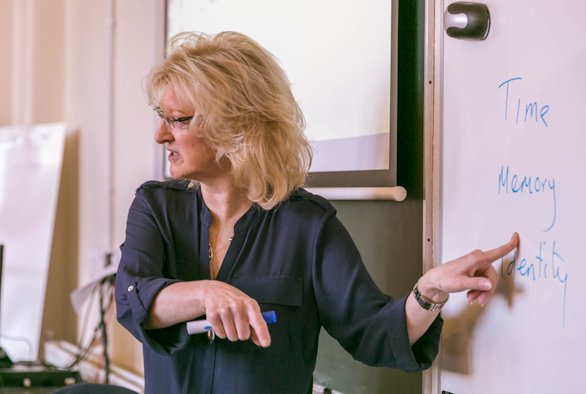
Continuing Education offers a wide range of short courses, lectures, film screenings, and events throughout the year with most courses offering reduced enrolment fees for students and staff and has pioneered the establishment and expansion of adult and continuing education in the community for more than 100 years.
Continuing Education Student Margaret Farnworth shares her experience of studying European Literatature In Translation, which will return for its 25th year this Autumn.
On a warm October morning in 1993 a group of eighteen or twenty of us crammed into a stuffy room in the Modern Languages building for the first session of a twenty-week course in “European Literature in Translation”. No one could possibly have realised that this was the start of a course which would still be running in 2017 and about to enter its twenty-fifth season.
Over the years we have been taught by five tutors, and have diversified from French literature to European Literature generally. Students have come and gone with many attending for a decade or more, and the enthusiasm and commitment of tutors and students alike remain undiminished. We have tackled works originally written in many languages, ranging from French and Italian to Russian and Scandinavian and have studied novels, plays, short stories and memoirs.
What’s the attraction of this course? Why do people sign up and in many cases stick with it for years? What do they get out of it?
Although many of those who attend are retired, and already have degrees and professional qualifications, some still find writing essays for assessment a welcome challenge. Others prefer to forego that pleasure, but will happily volunteer to prepare talks and presentations on topics of particular interest. Some enrol to follow up an interest in literature dating back to school days but side-lined through their working lives. Others are retired teachers or academics specialising in English or in modern languages who are looking to extend their existing knowledge. People who have never read outside English and American literature welcome the chance to explore a wider range of texts. Some enrol through personal recommendation from friends. As one member wrote – There is no better way of exploring ideas, thought and life than through literature.
The class provides what one student describes as a warm, welcoming, fun and stimulating environment in which to read and discuss texts. It’s important that we are led by a qualified tutor to direct our study, so that we are most definitely not a book group. But group discussion is a big part of the class, although no one is forced to contribute and if you just want to listen that’s fine. Cross-fertilisation of ideas is important, and people benefit from insights they would not necessarily have discovered for themselves. Because most members have decades of life experience, they bring a fascinating array of knowledge to the discussion.
Over the years, historians, artists, actors, academics and others have shared their expertise – and for several years a retired GP provided wonderful insights into the ailments of the characters we read about. We have always placed a strong emphasis on studying the works we study in their historical, social and political context, and where possible we look at clips of stage and film versions. As one member commented – Every week I leave the class feeling stimulated.
Over time we have become more than just an adult education class. Theatre and film trips take place if there’s a local performance of a text we’re studying. Weekly coffee breaks and end-of-term lunches provide a chance to chat. Friendships have developed and people meet informally out of class. Last year we had an innovation – an informal, twice-monthly reading group in a local cafe, intended to keep us in touch over the long summer break. We hope this will become a regular feature.
In October we plan to mark the anniversary of the Russian Revolution by reading some works from the Soviet period; I can promise anyone who decides to join us a lively, stimulating and enjoyable course.
And finally – a big thank you to the staff of Continuing Education who made all this happen.
European Literature will return for its 25th year this Autumn – if you would like to enrol email Continuing Education at: conted@liverpool.ac.uk and we will send you the details when they are ready.